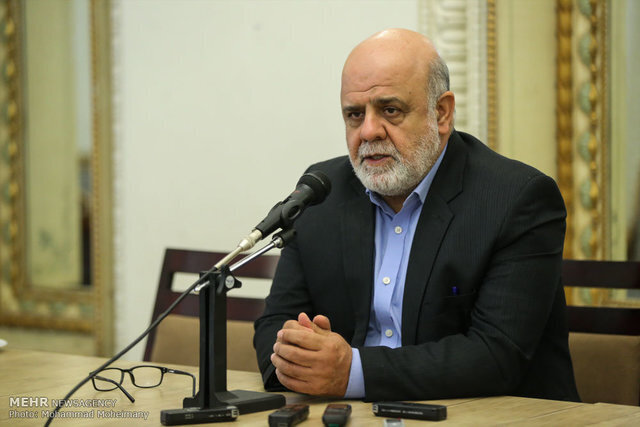Revenge for Soleimani assassination may not be necessarily military action, says envoy

TEHRAN — Iran’s ambassador to Baghdad has said the Islamic Republic’s revenge for the U.S. assassination of Lieutenant General Qassem Soleimani is not a military action necessarily.
“Revenge for the assassination of General Soleimani is not a military action necessarily, rather, the expulsion of American forces from the region can be revenge for General Soleimani’s blood,” Iraj Masjedi said, Tasnim reported on Tuesday, citing Al-Ahed news.
Masjedi said Tehran reserves the right to take revenge against the Americans for the “historic crime” of assassinating General Soleimani and Abu Mahdi al-Muhandis.
On January 3, U.S. President Donald Trump ordered drone strikes that martyred Soleimani, chief of the IRGC Quds Force, and al-Muhandis, the deputy commander of Iraq’s Popular Mobilization Units (PMU).
In the early hours of January 8, the IRGC attacked Ain al-Assad airbase in western Iraq, where U.S. forces were stationed, as part of its promised “tough revenge” for the U.S. terror attack.
Iran has also vowed to retaliate against the perpetrators of the attack at the right time.
Masjedi said that Iran’s missile attack on the U.S. military base of Ain al-Assad in Iraq was a response to the martyrdom of General Soleimani.
In remarks on December 22, the secretary of Iran’s Supreme National Security Council (SNSC) said Iran is determined to take “tough revenge” against the assassination in order to prevent the continuation of their terrorist acts.
“The Islamic Republic of Iran is determined to take tough revenge on the perpetrators of this historic crime, prevent the continuation of America’s terrorist, destabilizing acts, and force them to leave the region,” Ali Shamkhani said.
Shamkhani said the U.S. exit from the region will pave the way for sustainable peace and security.
He said the U.S. intensified its destabilizing moves in Western Asia, which reached its peak with assassination of Soleimani and al-Muhandis.
Masjedi also dismissed claims that Iran has turned Iraq into a place for the settlement of problems with others.
Iran does not seek to interfere in Iraq’s affairs and would never dictate its policies on the neighboring country, the ambassador stated.
He further dismissed the accusation of Iran’s role in a recent rocket attack on the U.S. embassy in Baghdad, saying Iran does not support any group that may have launched the attack.
The U.S. embassy in Baghdad came under rocket attacks on December 20. According to Iraqi press reports, at least 23 rockets landed in the Green Zone of Baghdad, a heavily fortified district in which the U.S. embassy and other government buildings are located.
The embassy’s C-RAM defense system was activated to intercept the rockets, the embassy said in a statement.
“The U.S. embassy confirms rockets targeting the International Zone (Green Zone) resulted in the engagement of embassy defensive systems,” the statement said, adding that the rockets have inflicted only minor damages to the embassy compound.
While the U.S. pointed the finger at Iran, the Iranian Foreign Ministry has strongly denied any involvement in the attack.
Saeed Khatibzadeh, spokesman for Iran’s Foreign Ministry, called the attack “unacceptable” and “dubious”.
Speaking at a weekly press conference on December 21, Khatibzadeh said, “Unfortunately, Iran’s diplomatic places in Iraq had also been attacked. We had pursued a steady policy that targeting diplomatic missions and residential areas is unacceptable.”
He added, “But the kind and timing of this attack [on the U.S. embassy], as well as the statement issued by the U.S. secretary of state, show that [the attack] is very dubious. Its timing is dubious. And more importantly, it seems that as if they had already prepared a statement to publish.”
MH/PA
Leave a Comment